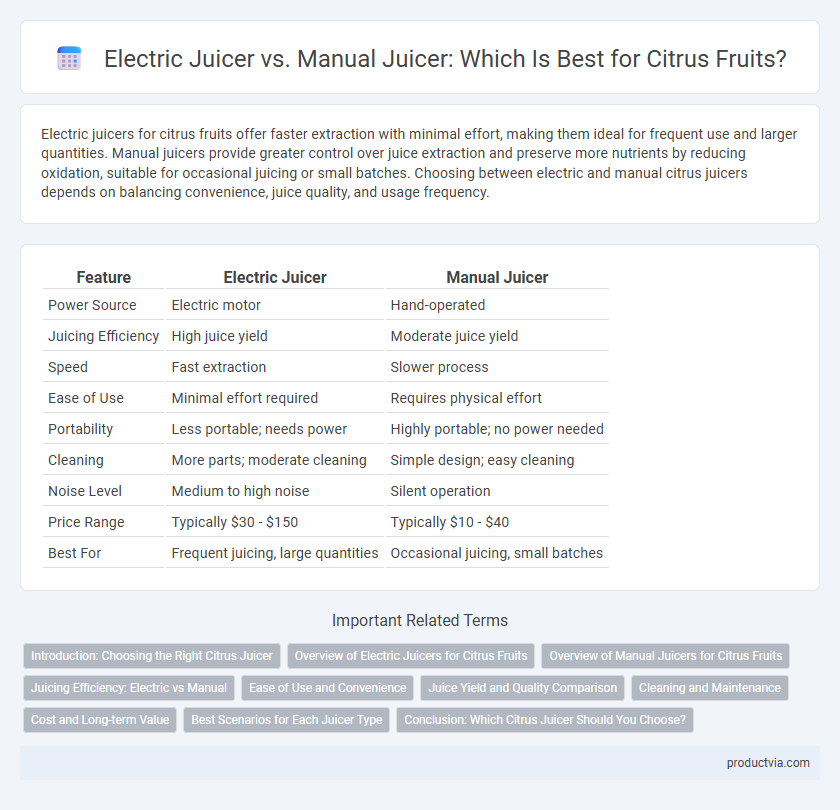Electric juicers for citrus fruits offer faster extraction with minimal effort, making them ideal for frequent use and larger quantities. Manual juicers provide greater control over juice extraction and preserve more nutrients by reducing oxidation, suitable for occasional juicing or small batches. Choosing between electric and manual citrus juicers depends on balancing convenience, juice quality, and usage frequency.
Table of Comparison
| Feature | Electric Juicer | Manual Juicer |
|---|---|---|
| Power Source | Electric motor | Hand-operated |
| Juicing Efficiency | High juice yield | Moderate juice yield |
| Speed | Fast extraction | Slower process |
| Ease of Use | Minimal effort required | Requires physical effort |
| Portability | Less portable; needs power | Highly portable; no power needed |
| Cleaning | More parts; moderate cleaning | Simple design; easy cleaning |
| Noise Level | Medium to high noise | Silent operation |
| Price Range | Typically $30 - $150 | Typically $10 - $40 |
| Best For | Frequent juicing, large quantities | Occasional juicing, small batches |
Introduction: Choosing the Right Citrus Juicer
Electric juicers offer powerful motors and automated extraction, delivering fresh citrus juice quickly with minimal effort, ideal for frequent juicing or large quantities. Manual juicers provide more control and are typically more affordable, requiring physical effort but ensuring preservation of flavor and nutrients. Selecting the right citrus juicer depends on usage frequency, desired convenience, and budget considerations.
Overview of Electric Juicers for Citrus Fruits
Electric juicers for citrus fruits offer powerful motor-driven extraction, enabling faster juice yield with minimal effort compared to manual juicers. These appliances typically feature adjustable pulp control and built-in filters to separate seeds and pulp efficiently, enhancing juice clarity and flavor. High-quality electric citrus juicers are designed with durable, food-grade materials that ensure safety and easy cleaning, making them ideal for frequent use.
Overview of Manual Juicers for Citrus Fruits
Manual juicers for citrus fruits provide a simple, cost-effective way to extract juice without electricity, using handheld reamers or lever mechanisms designed for easy pressing. These juicers preserve nutrients by minimizing heat and oxidation during extraction, ideal for retaining vitamin C and natural flavors. Their compact design and ease of cleaning make them a convenient choice for small kitchens or occasional use with oranges, lemons, and limes.
Juicing Efficiency: Electric vs Manual
Electric juicers offer superior juicing efficiency for citrus fruits by extracting higher juice yield with less physical effort, thanks to their powerful motors and rapid rotation speeds that break down fruit fibers more effectively. Manual juicers rely on user strength and technique, often resulting in lower juice extraction and longer preparation time, but they provide greater control over pulp content and juice consistency. For frequent juicing and larger quantities, electric models deliver faster processing and better efficiency, while manual options suit occasional use and quieter operation.
Ease of Use and Convenience
Electric juicers for citrus fruits offer faster extraction with minimal physical effort, making them ideal for frequent use and larger quantities. Manual juicers require more hand strength and time but provide greater control over juice flow and pulp content, suitable for occasional juicing. Electric models often feature automated pulp separation and easy cleanup, enhancing convenience for daily routines.
Juice Yield and Quality Comparison
Electric juicers for citrus fruits typically deliver higher juice yield due to their powerful motors and efficient extraction mechanisms, extracting more liquid from pulp compared to manual juicers. Manual juicers rely on hand pressure, which may result in lower juice yield but often preserve more natural flavors and nutrients due to less oxidation and heat generation. While electric juicers maximize efficiency and convenience, manual juicers offer superior control over juice quality, appealing to those prioritizing freshness and taste.
Cleaning and Maintenance
Electric juicers for citrus fruits typically feature detachable parts that are dishwasher-safe, streamlining the cleaning process and minimizing maintenance time. Manual juicers, while simpler in design with fewer components, often require thorough hand washing to remove pulp and seeds effectively. Regular maintenance of electric juicers includes periodic checking of motor vents and seals, whereas manual juicers demand minimal upkeep, primarily ensuring parts remain free of sticky residue to prevent mold growth.
Cost and Long-term Value
Electric juicers for citrus fruits typically have a higher initial cost, ranging from $50 to $150, but offer greater efficiency and speed, making them a better long-term investment for frequent juicers. Manual juicers cost between $10 and $40, providing affordability and durability with few moving parts, but require more effort and time, potentially limiting convenience for daily use. Considering maintenance, electric models may incur additional costs for repairs, while manual juicers often last longer with minimal upkeep, influencing overall value based on usage frequency.
Best Scenarios for Each Juicer Type
Electric juicers excel in scenarios requiring quick extraction of large quantities of citrus juice, making them ideal for busy kitchens or commercial use. Manual juicers are best suited for occasional juicing, small quantities, or when preserving the integrity and flavor of delicate citrus fruits. Choosing between the two depends on volume needs, time constraints, and preference for control over the juicing process.
Conclusion: Which Citrus Juicer Should You Choose?
Electric juicers offer faster juice extraction and higher efficiency for frequent citrus fruit consumption, while manual juicers provide greater control and durability with minimal noise for occasional use. Consider electric models for larger quantities and time-saving benefits, whereas manual juicers suit small batches and emphasize simplicity and portability. Your choice depends on frequency, volume, and preference for speed versus hands-on juicing experience.
Electric Juicer vs Manual Juicer for Citrus Fruits Infographic

 productvia.com
productvia.com